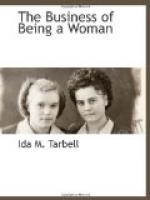Every home is perforce a good or bad educational center. It does its work in spite of every effort to shirk or supplement it. No teacher can entirely undo what it does, be that good or bad. The natural joyous opening of a child’s mind depends on its first intimate relations. These are, as a rule, with the mother. It is the mother who “takes an interest,” who oftenest decides whether the new mind shall open frankly and fearlessly. How she does her work, depends less upon her ability to answer questions than her effort not to discourage them; less upon her ability to lead authoritatively into great fields than her efforts to push the child ahead into those which attract him. To be responsive to his interests is the woman’s greatest contribution to the child’s development.
I remember a call once made on me by two little girls when our time was spent in an excited discussion of the parts of speech. They were living facts to them, as real as if their discovery had been printed that morning for the first time in the newspaper. I was interested to find who it was that had been able to keep their minds so naturally alive. I found that it came from the family habit of treating with respect whatever each child turned up. Nothing was slurred over as if it had no relation to life—not even the parts of speech! They were not asked or forced to load themselves up with baggage in which they soon discovered their parents had no interest. Everything was treated as if it had a permanent place in the scheme to which they were being introduced. It is only in some such relation that the natural bent of most children can flower, that they can come early to themselves. Where this warming, nourishing intimacy is wanting, where the child is turned over to schools to be put through the mass drill which numbers make imperative—it is impossible for the most intelligent teacher to do a great deal to help the child to his own. What the Uneasy Woman forgets is that no two children born were ever alike, and no two children who grow to manhood and womanhood will ever live the same life. The effort to make one child like another, to make him what his parents want, not what he is born to be, is one of the most cruel and wasteful in society. It is the woman’s business to prevent this.
The Uneasy Woman tells you that this close attention to the child is too confining, too narrowing. “I will pity Mrs. Jones for the hugeness of her task,” says Chesterton; “I will never pity her for its smallness.” A woman never lived who did all she might have done to open the mind of her child for its great adventure. It is an exhaustless task. The woman who sees it knows she has need of all the education the college can give, all the experience and culture she can gather. She knows that the fuller her individual life, the broader her interests, the better for the child. She should be a person in his eyes. The real service of the “higher education,” the freedom to take a part in whatever interests or stimulates her—lies in the fact that it fits her intellectually to be a companion worthy of a child. She should know that unless she does this thing for him he goes forth with his mind still in swaddling clothes, with the chances that it will not be released until relentless life tears off the bands.




